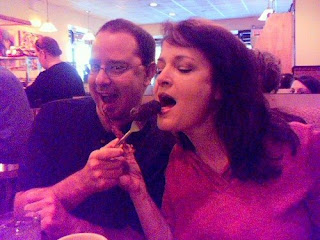Origin Stories
I saw this discussed on a reader board a few weeks ago, how many authors seem to have "origin stories" for their defining work. (The example there was Stephanie Meyer and her dreaming of sparkly vampires, which lead to the Twilight saga and surprise!vampire bebes.)
I did, in fact, dream a scene to an unfinished YA project that I'd love to get back to some day (it involves secret corps of vampires on either side of the Allied/German conflict in WWII and trying to reawaken Vlad Tepes to lead the Third Reich.)
But I was thinking about origin stories and how authors seem to cling to them as an added layer of mythos for their work. Part of me thinks, "Hey, cool, if you've got an iconic moment to put in your author bio" and another part of me (the bitchy part) thinks, "What, can't your work stand on its own? You need to enshrine it in layers of mythos to sell copies?"
Believe me, if you have an awesome "How I wrote the book" story, I'm all for it. I just don't know if I approve of the legendary quality of the writing of the book, from an author-as-teacher perspective, because I spend a lot of time when I'm doing workshops or panels trying to demystify the writing process for newbie authors. The fact is, a dream can only carry you so far. There's a lot of waking work that goes into a manuscript, and that's just the plain fact. There's very little that's mystical about the writing process--the spark of the idea, I agree, is something wonderful and strange, a synthesis of neurons and influence and floating bits of ephemera that somehow form the beginning of a novel. That part, that's the mythos, but the drafting process, taking the initial spark and making it into a combustion engine (okay, horrible metaphor, but you get the idea, right?) is hard work, and that's where the insinuation that books with an origin story are superior to those with the origin of "I got this idea, and I wrote it into a novel" becomes a little troublesome.
I don't know--what do the readers at home think? Mystical magical books or ordinary ideas turning into novels? Or should I just stick to writing funny posts about author web sites?
I did, in fact, dream a scene to an unfinished YA project that I'd love to get back to some day (it involves secret corps of vampires on either side of the Allied/German conflict in WWII and trying to reawaken Vlad Tepes to lead the Third Reich.)
But I was thinking about origin stories and how authors seem to cling to them as an added layer of mythos for their work. Part of me thinks, "Hey, cool, if you've got an iconic moment to put in your author bio" and another part of me (the bitchy part) thinks, "What, can't your work stand on its own? You need to enshrine it in layers of mythos to sell copies?"
Believe me, if you have an awesome "How I wrote the book" story, I'm all for it. I just don't know if I approve of the legendary quality of the writing of the book, from an author-as-teacher perspective, because I spend a lot of time when I'm doing workshops or panels trying to demystify the writing process for newbie authors. The fact is, a dream can only carry you so far. There's a lot of waking work that goes into a manuscript, and that's just the plain fact. There's very little that's mystical about the writing process--the spark of the idea, I agree, is something wonderful and strange, a synthesis of neurons and influence and floating bits of ephemera that somehow form the beginning of a novel. That part, that's the mythos, but the drafting process, taking the initial spark and making it into a combustion engine (okay, horrible metaphor, but you get the idea, right?) is hard work, and that's where the insinuation that books with an origin story are superior to those with the origin of "I got this idea, and I wrote it into a novel" becomes a little troublesome.
I don't know--what do the readers at home think? Mystical magical books or ordinary ideas turning into novels? Or should I just stick to writing funny posts about author web sites?


Comments